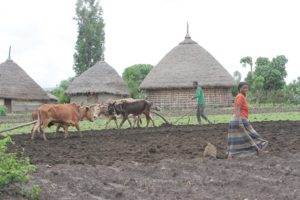On November 3, 2016, ESSP’s Hosaena Ghebru presented the latest research at EDRI on how the expectation of inherited land impacts young people’s decisions on migration and employment in rural Ethiopia.
Research Questions
This presentation centered on two research questions:
- How does the amount of land youth expect to inherit affect their migration and employment decisions?
- What is the differential impact of expected inheritance on youth
- With various age and gender groups?
- With or without access to functioning land rental markets?
- Based on their residential proximity to major urban centers?
Background
Land is formally owned by the Ethiopian Government, with formal land markets (sales) outlawed and major land access made via administrative redistribution. However, due to its adverse tenure security effect, redistribution has long been abandoned. The country is now facing acute problems of land scarcity – especially in the highlands, and household farm sizes are dwindling. Youth rely on periodic land redistributions, inheritance, or small rental markets to access land.
Individual land users have legal rights to transfer their land use rights to their children or other family members, or rent the land to any other person. Land inheritance is not uniform across descendants of the household head, due to cultural norms, such as gender and birth order. The customary norms favor men, along with the negative effect on land inheritance which is guided by the number of male siblings within a family.
What encourages migration?
Migrants are predominantly “pushed” from their homes rather than attracted by an urban “pull” of higher returns on human capital investments. To decrease the risks of impoverishment, such as the effect of drought, decline in agricultural productivity, shortage of land and shortage of employment opportunities, the youth diversify their approach to income generation and seek educational opportunities.
Data used
Panel survey data collected in 2010 and 2014 was used in this research, gathering data from approximately 1800 households in 27 woredas (districts) of rural Amhara and Oromia regions of Ethiopia. During the first round survey in 2010, data were collected on household members aged 15-34 years. During the second round survey in 2014, the focus was slightly different: information on spatial location and employment decisions was collected, in addition to the household data, and details of all descendants of the head or their spouse. This enabled an analysis of expected inheritances as well a migration and employment decisions made between 2010 and 2014 of all descendants.
Major findings
Our results showed that larger than expected inheritances: i) Lowers the likelihood of long-distance and rural-to-urban permanent migration ii) Increases the likelihood of employment in agriculture iii) Reduces the likelihood of employment in the non-agricultural sector, and iv) Does not affect the decision to study.
Ghebru concluded that the results appear to be driven by male and other youth, and that inheritance plays a more pronounced role in areas with less-vibrant land markets and in more remote areas.
Full details of this presentation are available on ESSP’s website.
This presentation was organized by ESSP with support from EDRI. ESSP is a collaborative program undertaken by IFPRI and EDRI, whose objective is to help improve the policy-making decision process in Ethiopia.
Please subscribe to receive regular updates on ESSP’s work and its quarterly newsletter.
Keep updated with cutting edge research from Ethiopia.
